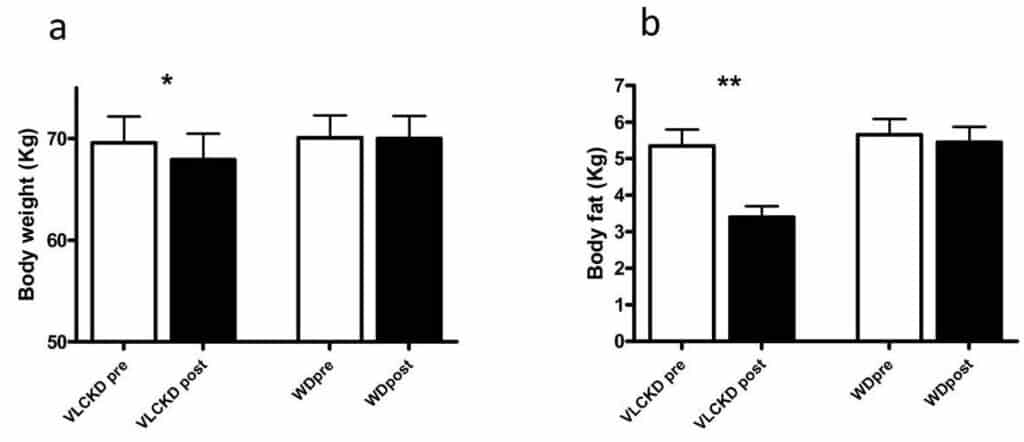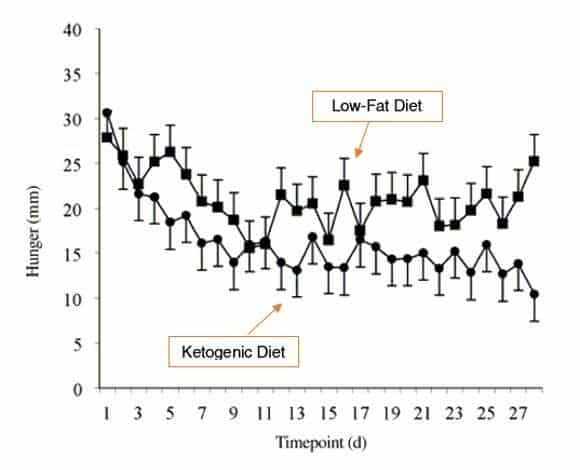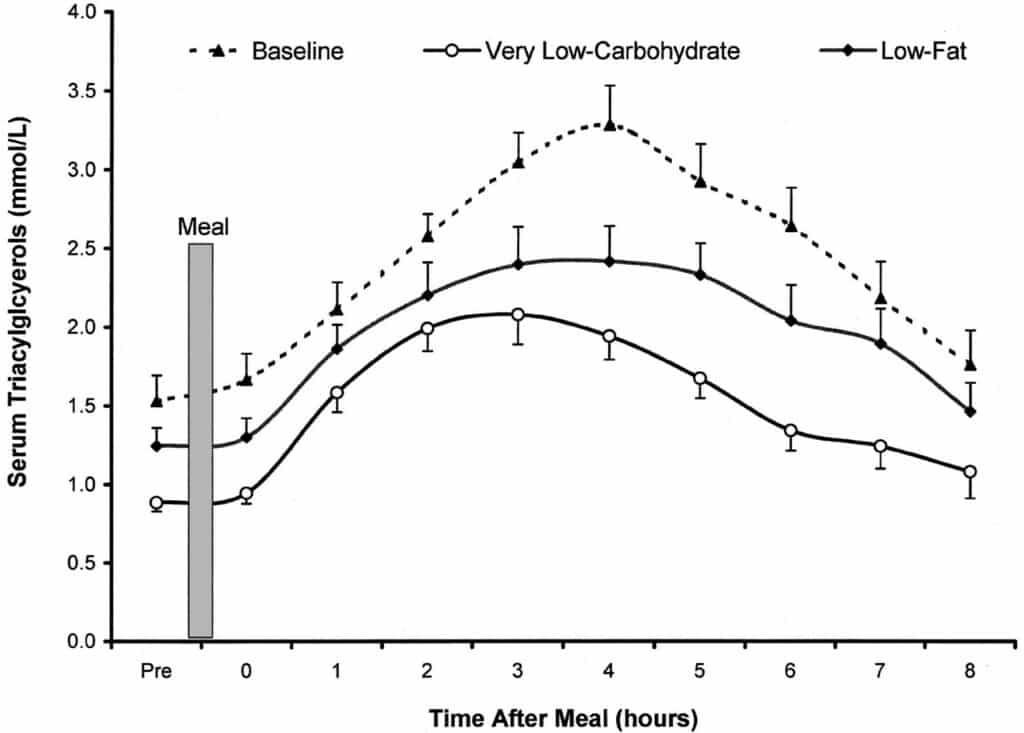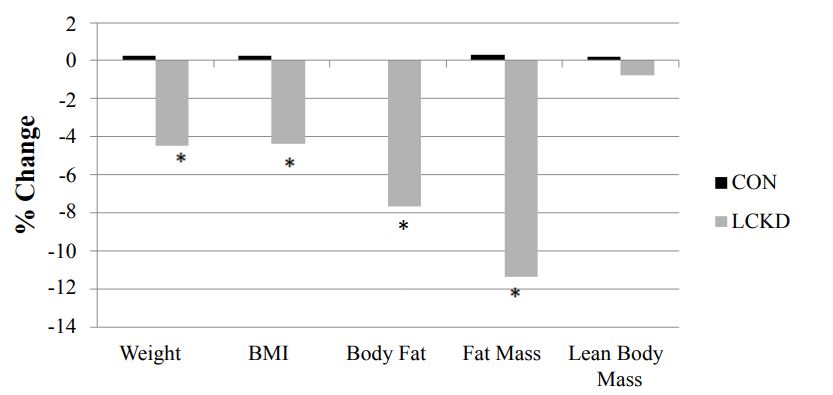The ketogenic diet is now rapidly gaining popularity, and an increasing number of people have decided to give it a try, for weight loss or for general health, or even for improved energy levels, or any of its other benefits.
Does the keto diet live up to the expectations, though?
Does the science back up its claims?
Is there any definite advantage to this way of eating, compared to other ones?
Let’s look into what the studies say.
#1. No Significant Reduction Of Strength In Athletes Was Detected In A 30-day Experiment, While A Significant Amount Of Fat Was Lost

Bodyweight and fat mass reduction in a ketogenic diet compared to a Western diet.
Source: Paoli A et al., “Ketogenic diet does not affect strength performance in elite artistic gymnasts”, Journal of the International Society of Sports Nutrition, 2012 (1)
As you can see from the chart above, published in A. Paoli’s 2012 study, a 30-day very low carbohydrate ketogenic diet (VLCKD) can be a very effective way to reduce body weight and fat mass, compared to a Western diet (WD).
At the same time, the authors concluded, it doesn’t significantly affect strength performance in athletes, so fears that the keto diet would be detrimental to your workouts might not be justified.
During the adaptation phase a decrease in performance is indeed felt by many people, but this isn’t a long term effect.
#2. A High-protein Ketogenic Diet Plays A Significant Role In Hunger Control
Hunger control is extremely important when dieting, and the ketogenic diet has been shown to have a very positive effect on it.

Mean daily hunger on a ketogenic (lower levels) vs. non-ketogenic diet (higher levels).
Source: Johnstone AM et al., “Effects of a high-protein ketogenic diet on hunger, appetite, and weight loss in obese men feeding ad libitum”, The American Journal of Clinical Nutrition, 2008 (2)
A study by Johnstone et al., published in The American Journal of Clinical Nutrition in 2008, where subjects were eating as much food as they wanted, demonstrated that high-protein ketogenic diets are a very effective measure for reducing hunger and food intake, as compared to high-protein medium-carb diets (that do not induce ketosis).
Subjects intuitively ate less food on a ketogenic diet, as they felt less hungry, and the subjective pleasantness of the two diets was with no significant differences.
#3. A Very Low-calorie-ketogenic Diet Is A Safe And Efficient Method For Weight Loss And Improving Blood Sugar Control In Patients With Type 2 Diabetes
A study by Goday A. et al., published in Nature in 2016, concluded that a calorie-restricted ketogenic diet is a safe option for weight loss and glycemic control in type 2 diabetes mellitus patients when compared to a standard low-calorie diet, where no significant side effects were detected (3).
Additionally, the diet was well-tolerated by the people who participated in the study.
Out of 89 patients aged between 30 and 65 years, a ketogenic diet was randomly assigned to 45 of them, where they followed it for a total of 4 months.
The remaining patients followed a low-calorie diet with the same duration. Protein was kept adequate for both groups.
Throughout the 4-month period, as well as at the end of it, the subjects were examined, and weight loss was noticeably better for the ones who followed a ketogenic diet.
Additionally, blood sugar levels and insulin sensitivity improved.
#4. A Very Low-carb Diet Can Be Beneficial For Managing The Levels Of Triglycerides In The Blood After A Meal
Postprandial lipemia is a state in which circulating triglycerides in the blood rise after a meal, and is a risk factor for cardiovascular disease.

Triglyceride levels after a meal in overweight men – a comparison between a high-fat (baseline), very low-carbohydrate or a low-fat meal. The very low-carb meal had the most positive effect.
Source: Sharman MJ et al., “Very low-carbohydrate and low-fat diets affect fasting lipids and postprandial lipemia differently in overweight men”, The Journal of Nutrition, 2004 (4)
A study on overweight men from 2004 discovered that a very low-carb diet can significantly reduce postprandial lipemia, compared to a high-fat meal and even to a low-fat one.
Additionally, although a low-fat diet had a stronger effect on lowering LDL (“the bad”) cholesterol levels in the blood in the short term, a low-carb one was better at managing the symptoms of metabolic syndrome.
It also had a stronger effect on lowering the levels of both blood sugar and fasting lipids and on increasing LDL particle size (which makes LDL significantly less dangerous).
On top of that, the low-carb diet leads to better weight loss, according to the authors of the study.
#5. A High-protein, Low-fat Ketogenic Diet Can Be Hugely Beneficial For Obese Adolescents
A study published in 1998 by Willi SM et al., demonstrated that a high-protein ketogenic diet where calories are severely restricted can lead to a major weight loss in obese adolescents (5).
While this diet was also low in fat, and very low in calories (thus making it suitable only for short-term interventions), making it more similar to a PSMF (protein-sparing modified fast) type of diet, it does demonstrate that lean mass is not significantly affected by a ketogenic diet, where enough protein is consumed.
The patients (with a starting weight within the range of 120.6 to 198.6 kg) consumed a high-protein ketogenic diet for a total of 8 weeks and lost an average of 15.4 +/- 1.4 kg during that period of time, most of which was fat.
#6. A 6-week Ketogenic Diet Combined With A Crossfit Program Is Very Efficient At Lowering Body Mass, Body Fat Percentage And Bmi, At No Significant Loss Of Lean Body Mass
Diet and exercise combined together are powerful tools in achieving a better body composition – ultimately, we’re all after looking better, not after losing muscle and looking less fit (achieving the so-called “skinny-fat” look is not very exciting at all).
And when you combine some sort of resistance training (such as CrossFit) with keto, the results can be very good, as Gregory et al. have shown in a study from 2017.

Change in weight, BMI, body fat percentage, fat mass, and lean body mass in individuals following a CrossFit program, eating either a low-carb ketogenic diet where carbs are kept under 50 g daily (in grey) or their usual diet (in black).
Source: Gregory RM et al., “A Low-Carbohydrate Ketogenic Diet Combined with 6-Weeks of Crossfit Training Improves Body Composition and Performance”, International Journal of Sports and Exercise, 2017 (6)
As you can see from the graph, the reduction of fat mass and body fat percentage for the keto group was massive, while the control group experienced practically no changes for either of these things.
The subjects following a ketogenic diet were instructed to keep their carbs below 50 g daily (which for sedentary individuals who do not workout could be almost too much, but for physically active people is most likely a safe limit), while not restricting calories.
The control group had continued with their usual way of eating. The people who participated had varying levels of fitness and weren’t elite athletes.
The changes in body weight and fat mass, in particular, could be explained with the fact that the ketogenic diet is particularly beneficial for controlling hunger.
Although all subjects were instructed to not restrict calories, the low-carb group maintained a lower calorie intake throughout the study.
On top of that, circulating insulin (and blood glucose levels) were lower for the low-carb group at the end of the study. Lean body mass remained constant, confirming the hypothesis that a well-formulated ketogenic diet does not lead to muscle loss.
#7. A Low-carb Diet Is More Beneficial For The Management Of Type 2 Diabetes Than A Low-calorie Diet
A study by Hussain TA et al. entitled “Effect of low-calorie versus low-carbohydrate ketogenic diet in type 2 diabetes” and published in Science Direct in 2012 demonstrated that while both a low-calorie and a low-carb diet can have a positive effect on type 2 diabetes’ symptoms, a ketogenic diet proves to be more beneficial and has a stronger effect on blood sugar levels (7).
In the study, 163 overweight and obese subjects underwent a 24-week diet. 102 of them suffered from type 2 diabetes, and all participants could choose a diet of their preference – either a low-carb ketogenic one or a low-calorie one.
Diabetes medication was lowered or sometimes completely discontinued for some of the diabetic patients, and different parameters were measured every 4 weeks, such as body weight, waist circumference, total cholesterol, LDL and HDL cholesterol, and triglycerides, among others.
The low-carb group did better than the low-calorie group for all stats that were measured.
Nevertheless, and that’s also an important point the authors of the study made, if you have diabetes, starting a ketogenic diet requires medical supervision, as the doses of the medication you are taking to manage your condition would need to be adjusted in accordance to the decrease of blood sugar levels.
#8. The Ketogenic Diet Can Be A Viable Treatment Option For Patients With Epilepsy
The ketogenic diet has been around for many decades (since the 1920s, to be precise) as a possible treatment for epilepsy, especially for children, so there’s a multitude of studies documenting its possible anti-seizure effects in patients suffering from epilepsy.
It turns out that keto can be an effective method for the management of epilepsy in adults, too, as demonstrated in a recent article by Williams TJ and Cervenka MC, entitled “The role for ketogenic diets in epilepsy and status epilepticus in adults” that was published in Science Direct in 2017, and which reviews a number of available studies (8).
Williams and Cervenka have assessed the efficacy of the ketogenic diet as a treatment for epilepsy, based on a number of existing studies, and have concluded that keto reduces seizures by more than 50% in 22-70% of the patients (varying by study) and by more than 90% in up to 52% of the patients (again, the results were different for the different studies).
The modified Atkins diet (also a low-carb diet) yielded similar results.
Adverse effects of the keto diet for epilepsy treatment were mild and typically easy to manage or to resolve completely (f.e. by increasing fiber, electrolyte and water intake).
Weight loss was a side effect that was often noted, thus patients not wishing to lose weight typically needed to increase calories. In general, the diet was an effective, well-tolerated and welcome intervention for many patients.
#9. The Ketogenic Diet Reduces Inflammation And Helps Manage The Different Components Of Metabolic Syndrome Better Than A Low-fat Diet
A study by Forsythe et al., named “Comparison of Low Fat and Low Carbohydrate Diets on Circulating Fatty Acid Composition and Markers of Inflammation” and published in 2007, followed 40 overweight patients (men and women) for 12 weeks, whereas they were randomly assigned a very low-carb ketogenic diet or a low-fat one (9).
All patients were consuming approximately 1500 kcal / daily during the 12-weeks intervention phase (from a baseline of 2000 to 2300 kcal).
Although the subjects who were following a low-fat diet demonstrated some noticeable improvements in different metabolic markers, the patients who were following a ketogenic diet did much better, overall.
They lost more weight, their blood sugar levels and insulin sensitivity improved, and HDL (the “good”) cholesterol raised significantly. As for inflammatory markers that were examined, again, the very low-carb group did much better overall.
The study concluded that metabolic syndrome responds very well to a reduction in carbohydrate intake while reducing total and saturated fat only had a modest effect on its symptoms.
Overall, that’s very good news for anyone who is concerned with lowering their risk of developing metabolic syndrome, as carbohydrate restriction seems to be a successful strategy for that.
#10. The Ketogenic Diet Might Be A Beneficial Addition To Anti-cancer Treatment
While studies who can draw clear conclusions on the effect of the ketogenic diet on cancer in humans are still limited, a number of cases have been reported where the diet had an anti-tumor effect.
Additionally, animal studies look promising – 72% of them demonstrate that a ketogenic diet has certain anti-tumor properties, as concluded by RJ Klement in his review of existing studies entitled “Beneficial effects of ketogenic diets for cancer patients: a realist review with focus on evidence and confirmation” and published in 2017 (10).
The review concludes that no serious side effects have been observed and that there were absolutely no instances in which the diet had a pro-tumor effect. For this reason, it’s certainly a viable option worth examining.
More studies are necessary to further shed light on how cancer patients can benefit from a ketogenic diet, but at the moment it’s definitely a strategy that they might wish to try, in addition to traditional anti-cancer treatment strategies.
Our Conclusion
As you could see, the ketogenic diet can have a powerful effect on your general health. It can help patients reverse metabolic syndrome and successfully manage type 2 diabetes (where medication is significantly decreased or sometimes stopped completely).
Keto is also a viable treatment strategy for epilepsy in adults and children alike, and it helps patients lose weight at a better rate than other diets, while preserving their lean body mass.
It’s one of the most studied diets out there, as it has been around for almost 100 years already, and the overwhelming majority of the studies demonstrate its effectiveness, together with an excellent safety profile.
Currently, there are practically no studies on the long term effects of the ketogenic diet (when it’s followed for periods longer than 1-2 years), however it is clearly an excellent short- and mid-term intervention strategy, especially for people who are overweight and wish to improve their body composition, or struggle with a decreased insulin sensitivity or worsened blood sugar control.
For a full list of scientific studies on low carb and keto diets, check this page!
Enjoy this post? Share to save for later!

Photo credit: VitalikRadko – Sewcream – gdolgikh/Depositphotos.com







